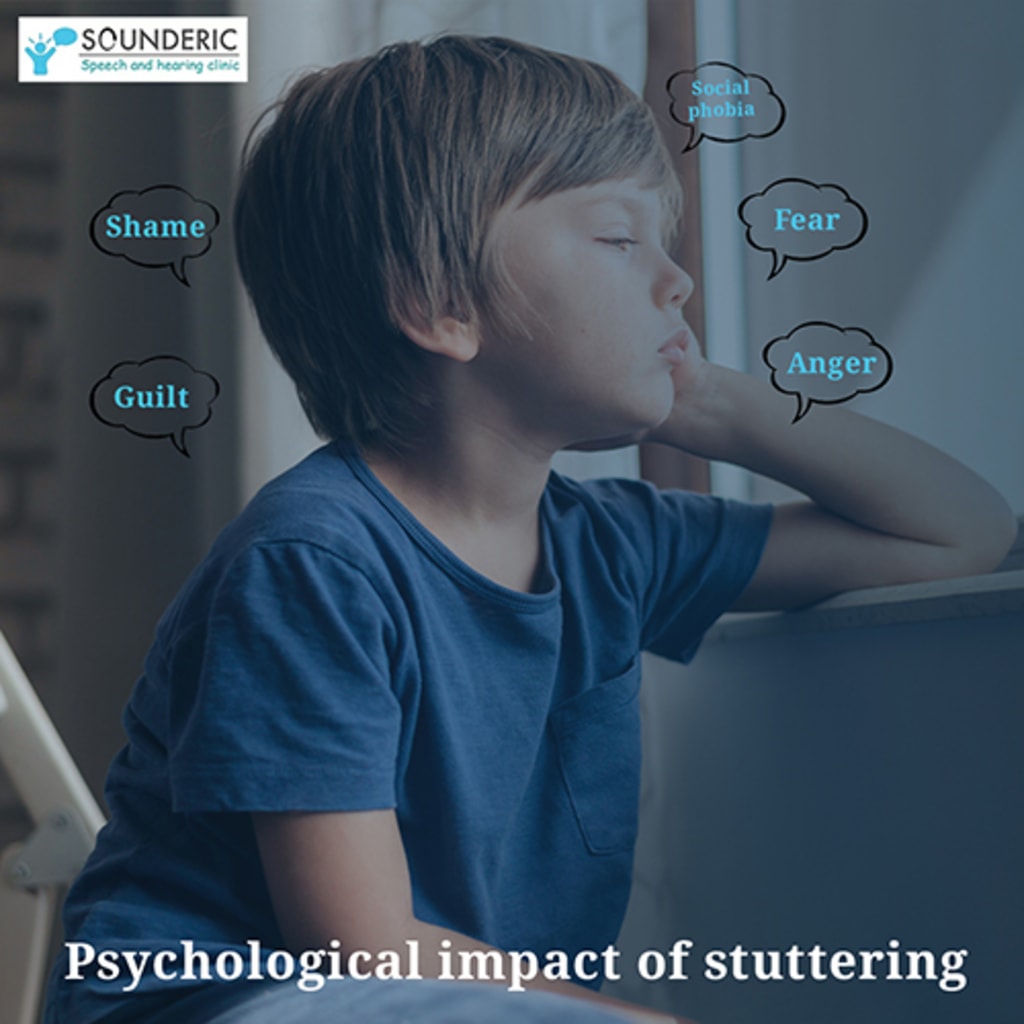Psychological Impact of Stuttering
Trauma leaves a mark. The feeling of being ‘different’ or being thought of as such, always leaves a mark. Multiple studies prove that children who stutter are at a higher risk of bullying, social exclusion, and negative perception of self. Such traumatic experiences leave their scars. As adults who continue to stutter or who have recovered from their disfluency, those early rejections and emotional violence colors their understanding of themselves and the world around them.

Stuttering is a speech-motor disorder that is still widely ridiculed in society. Decades of research have given us insight into the causes, indicators, and symptoms of stuttering, as well as techniques to lessen its severity. Despite all of this, very little research has been done on the less evident signs and repercussions of speech disfluency.
Psychological Impact
Stuttering can cause a wide range of physiological impacts. This mainly occurs in adolescents who face physical, emotional & personality changes as they become adults. Stuttering is not induced by strain or stress, but it can cause anxiety for teenagers.
Adolescents who stutter have below-average speech competence, intensified communication judgment, are taunted and threatened more often than chatty peers, and try to keep their stuttering secret. The families of the adolescents in a study reported high levels of emotional anxiety, family conflict, and difficulty managing their child's frustrations and tantrums.
The adolescent might feel frustrated or embarrassed because of how other children react to the way they speak. A child who stutters cannot control it, and the teenagers who stutter have the same social skills as non-stuttering kids.
Stuttering & Anxiety
Anxiety, tension, fear, humiliation, irritation, and uncertainty are just a few of the less visible symptoms. In addition, it's typical for teenagers and adults to have severe self-doubt and self-criticism due to their stuttering.
People who stammer frequently experience social anxiety, generalized anxiety, and tension.
For people who stutter (PWS), anxiety about social contacts is exacerbated by the fear of being evaluated for their disfluency, humiliation, and shame. As a result, they frequently exhibit anxiety disorder symptoms such as shortness of breath, dizziness, and a rapid pulse. However, these disorders are rarely identified and diagnosed formally until they directly contribute to the change in their quality of life.
Stuttering is not scientifically proven to cause depression. However, the inability to express oneself over time, repeated episodes of social anxiety, a drastic retreat from social life, and self-imposed limits may contribute to grave emotions that could intensify despair.
Although there is no clear relationship between depression and stuttering, it is still a worrying statistic that reveals depression is widespread among the PWS.
More often than not, the kid who stutters is subjected to bullying. And this could probably come across as the most common challenge people who stutter face at school. But there is much more that takes a direct hit.
There are many critical aspects of communication skills that have been impacted by stuttering. Adolescents may not find stuttering a stigmatizing condition; however, they prefer not to discuss it with other people.
These could be few psychological challenges faced by adolescents who stutter:
- Class participation: Middle schoolers who stutter are less likely to be thought of as leaders by their peers. Adolescents who stutter might not want to join in with classroom discussions and are more likely to be bullied compared with students who don't stutter. Teenagers develop anxiety because of their stuttering. They might feel self-conscious, have lower self-esteem, and find some situations challenging, such as public speaking. Adolescents often learn to avoid difficult words or opportunities to speak instead of using gestures and short sentences to communicate.
- Impact on learning: Because of stuttering, children who stutter might not participate whole-heartedly in the class and may not do as well as they are capable of. They might also start staying away from school, and statistics show that many students do not finish their schooling or drop out soon because their worth is questioned every step of the way.
- Anxiety: Though the answer is still unclear about the relationship between stuttering and anxiety levels, having a speech predicament makes the phase of adolescence more stressful and difficult. Adolescents who stutter have higher levels of anxiety than fluent adolescents.
We at Sounderic are passionate about helping kids, teenagers, and adults deal with stuttering in the best possible way. After a comprehensive evaluation by our speech therapists, we help our clients make an informed decision about the best treatment approach that can be made.
Treatment doesn't necessarily eliminate stuttering, but it teaches skills to improve speech fluency, develop effective communication, and many more. With support from family and school and our specialized therapy delivered by our experienced pathologist, children who stutter get the opportunity to realize their potential.





Comments
There are no comments for this story
Be the first to respond and start the conversation.